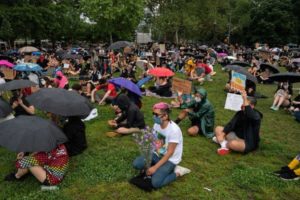Chapter Talk by Dom Mark Scott, abbot of New Melleray Abbey, on June 7, the Solemnity of the Most Blessed Trinity
“America burning.” That was one headline I saw last week. There was some truth to that statement. There were buildings and automobiles set ablaze in many cities. Even Saint John’s church in Washington, D. C., and a police station in Minneapolis. On the other hand, I don’t think Dubuque or Peosta were burning, and we are part of America, too. The book The Great Migration reminded us of the Chicago riots and the Watts riots of 1968 and the Rodney King riots of 1992. Incendiary riots are nothing new in America.
James Mattis, Marine General and former Secretary of Defense in the Trump Administration, said something that puts these conflagrations in perspective. Last week Mattis made a statement in which he said, “The words ‘Equal Justice Under Law’ are carved in the pediment of the United States Supreme Court. This is precisely what protesters are rightly demanding. It is a wholesome and unifying demand—one that all of us should be able to get behind. We must not be distracted by a small number of lawbreakers. The protests are defined by tens of thousands of people of conscience who are insisting that we live up to our values—our values as people and our values as a nation.”
I like that balanced view of what happened last week. It makes the word “burning” in the headline, “America is burning,” into a metaphor, similar to the Prophet’s saying, “Zeal for your house has consumed me” (Ps 69:9). It was heartening to read a NY Times report yesterday: “The protests that have filled New York’s streets in recent days entered their second week on Friday with thousands of people gathering at sites across the city for demonstrations, marches and vigils that continued to be overwhelmingly peaceful.”

Riots are one thing, protests another. Even so, riots have their purpose. They awaken us from illusions. Insurance policies do not cover losses sustained by riots. Imagine a riot in Peosta spills over onto Monastery Road and at Trappist Caskets windows are broken, inventory burned, tools are carried away or destroyed in place. Tough break for T. C.; insurance company washes its hands. Insurance covers eventualities that happen and by compensation renders them harmless, as if they did not happen. But riots are not supposed to happen. When they do, providence fails and you are left only with the broken illusion that like Job everything will be restored to what it was before only better. It won’t be.
And so maybe the few riots that have marred the protests can serve to show that what even the legitimate protests think they are responding to is not really the heart of the issue. At the center of the protests is a dead man, killed by authorities at a particular moment in time, observed, and remembered by bending the knee. I don’t mean George Floyd. Of his death and of others like it, Pope Francis last week said, “We cannot tolerate or turn a blind eye to racism and exclusion in any form and yet claim to defend the sacredness of every human life. At the same time, we have to recognize that ‘the violence of recent nights is self-destructive and self-defeating. Nothing is gained by violence and so much is lost.’”
But as contemplatives we see that at the heart of the problem as both its cause and its resolution is not George Floyd, who pleaded, “I can’t breathe”; it is the Crucified Christ who said, “I thirst.” In every brutal death, in every death devoid of justice, Christ is crucified again, the Lamb slain from the foundation of the world (Rev 13:8). But this duration of the Cross means also that the Cross will never stop being the invitation to and the place of forgiveness grounded in justice and issuing in reconciliation, and we mean, in the first place, God’s forgiveness, God’s justice, and God’s gracious gesture of reconciliation. The moral heart of the Cross is forgiveness without resentment or revenge….